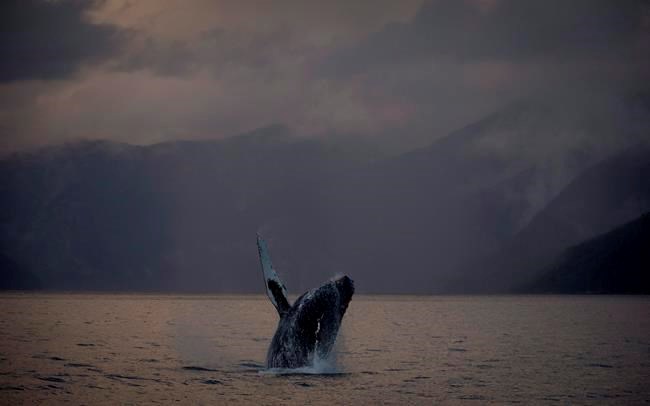VANCOUVER — Marine mammal rescue groups and federal fisheries officials are not sure how much fishing gear three entangled humpback whales seen in the waters off the coast of British Columbia are still carrying, leaving experts worried.
Three humpback whales were found entangled in fishing gear in the last week of July and while rescue groups along with federal officials have managed to get some gear off of one of the animals, they are not sure how the other two are faring, said Paul Cottrell, the Pacific marine mammals co-ordinator for the Department of Fisheries and Oceans.
"We're not fearing the worst, we're hoping for the best, I guess. We're just hoping that the animals get re-sighted and that we can find them. That's what we're hoping for."
The rescuers were out on the eastern side of Vancouver Island last week where one of the whales named Checkmate has been seen hanging around, Cottrell said.
The whale has a trap and line running through its mouth and is trailing other gear. Rescuers also realized that someone had cut off the buoy making it difficult to spot the animal.
"Unfortunately (the gear) is quite close to the body," he said, explaining that it makes it difficult to see.
They are hoping to use drones to confirm how much fishing gear it is carrying when they spot the humpback, he said.
For now, the animal has been "acting like a normal humpback" and been seen swimming and feeding, which Cottrell said is a good sign.
However, Joe Gaydos said when the gear goes through the mouth and baleen, which is the whale's filtering teeth, then it is less likely to shed it off without help.
"The fact that the gear goes through the mouth doesn't give me a lot of hope the gear will just come off on its own," said the science director for the SeaDoc Society from the University of California, Davis.
"Those poor entangled whales. I'm not optimistic this will turn out well. Honestly, it makes me sad to think about."
Humpbacks are classified as special concern under the Species at Risk Act. They number about 18,000 according to the Fisheries and Oceans Canada website.
Cottrell said rescuers haven't spotted a whale that has a net over its head for about three weeks.
That animal, which has not yet been named, was last seen in the Central Coast, which Cottrell said is a large body of water with few boaters. He said that makes it even harder to know the condition of the animal.
Once the animal is seen and photographed, experts can assess how much gear is left and what the state of entanglement is, he said.
The key to helping these animals get free is locating them, Cottrell said.
If rescuers are called as soon as the animal is seen they can get there quickly and assess the situation, he said.
"If it's even a couple hours later those animals can travel vast distances in a short amount of time."
Gaydos said large whales like these can trail gear for a long time, leading to a slow and painful demise.
Occasionally they can shed it but at other times the first set of gear can attach to more, causing the animal to drag several metres of net and line, he added.
Martin Haulena, head veterinarian at the Ocean Wise Marine Mammal Centre and the Vancouver Aquarium, said if animals are unable to forage with gear restricting either the mouth or impairing ability to dive and swim, then they will starve to death.
"Some gear starts to cut into the tail, flippers or mouth. That is really painful," he said.
"If it introduces bacteria or fungus into the bone or bloodstream that can cause a serious infection and that can also kill the animal. If there is a lot of gear, then the animal can drown. Unfortunately, all of these are horrible ways for a whale to die."
The rescuers were able to get off more than 60 metres of fishing gear of a whale named X-ray.
Cottrell said that humpback was last seen travelling north along the east coast of Vancouver Island more than three weeks ago and rescuers are cautiously optimistic that it has been able to slip out of the rest of the gear.
Haulena said once the gear is on, it is very difficult for the animals to remove it although if the responders were lucky and cut just the right bit, the animal can slip off from the entanglement.
"Experienced people know where the best cuts can be made."
Gaydos said with more fishing gear and a growing whale population, entanglements are not going away unless something is done.
"Scientists are working with the fishing community to help redesign the way the gear is set up. I'm hopeful this will help," he said.
"In the meantime, we need to keep disentangling animals."
This report by The Canadian Press was first published Aug. 30, 2020.
Hina Alam, The Canadian Press



